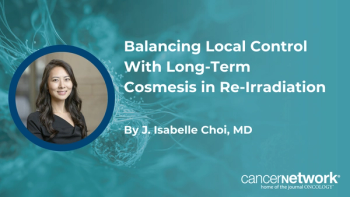
Adding Utidelone Improved Outcomes in Heavily Pretreated Breast Cancer
Combining a genetically engineered epothilone analog known as utidelone with capecitabine significantly improved progression-free survival in women with metastatic breast cancer who were refractory to anthracycline and taxane regimens.
Combining a genetically engineered epothilone analog known as utidelone with capecitabine significantly improved progression-free survival in women with metastatic breast cancer who were refractory to anthracycline and taxane regimens, according to a new phase III trial.
“Increased use of standard chemotherapy, especially anthracyclines and taxanes, in the adjuvant setting of breast cancer care has led to an increase in a heavily pretreated and drug-resistant metastatic breast cancer population and a risk of cumulative toxicities,” wrote study authors led by Pin Zhang, MD, of the Chinese Academy of Medical Sciences and Peking Union Medical College in Beijing. Epothilones are microtubule inhibitors with different mechanisms from commonly used therapies; one such therapy, ixabepilone, is approved in the United States, but carries substantial toxicities including myelosuppression and peripheral neuropathy.
Earlier work on utidelone, a synthetic analog of those agents, suggests it has substantial antitumor activity with fewer side effects. The new study included 405 patients with metastatic breast cancer who were refractory to anthracyclines and taxanes. They were randomized 2:1 to either utidelone plus capecitabine (270 patients) or capecitabine alone (135 patients), and followed for a median of 6.77 months and 4.55 months, respectively. The results were published online ahead of print in Lancet Oncology.
This was a heavily pretreated population; the median number of previous chemotherapy regimens was two, and about 40% of patients had received three or more previous regimens. The median age was 50 years, and common metastasis sites included the lymph nodes, lungs, bone, and liver.
The median progression-free survival was 8.44 months with utidelone, compared with 4.27 months without it, for a hazard ratio (HR) of 0.46 (95% CI, 0.36–0.59; P < .0001). This independent review was similar to that found by investigator assessment. Response rate was also better, at 40.4% vs 21.5%, according to independent review (P = .0002), as was the proportion of patients who achieved a clinical benefit, at 53.9% vs 26% (P = .0001).
The overall survival data is not yet mature, but after 155 deaths (of 310 needed for data maturity) the overall survival data favors the utidelone group. The median overall survival with utidelone was 16.13 months, compared with 12.78 months with capecitabine monotherapy, for an HR of 0.63 (95% CI, 0.45–0.88; P = .0059).
Dose reductions due to treatment-emergent adverse events were required in more patients in the combination group; 60 patients (23%) required a utidelone reduction, and 53 patients (20%) in the combination group required a capecitabine reduction, while only 19 patients (15%) in the monotherapy group required one. With the combination, this was most commonly due to peripheral sensory neuropathy and palmar-plantar erythrodysesthesia. Grade 3 peripheral neuropathy was reported in 22% of the combination patients, compared with only one in the monotherapy group; there was no grade 4 neuropathy reported.
“In light of our findings, future development for the role of utidelone in earlier settings of breast cancer is warranted,” the authors wrote, adding that optimizing the formulation could help reduce the incidence of peripheral neuropathy.
Newsletter
Stay up to date on recent advances in the multidisciplinary approach to cancer.











































